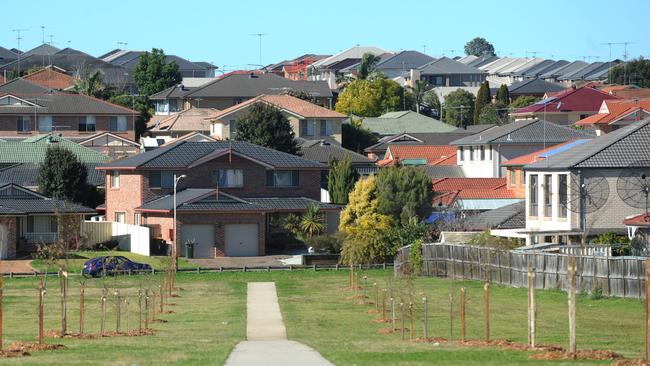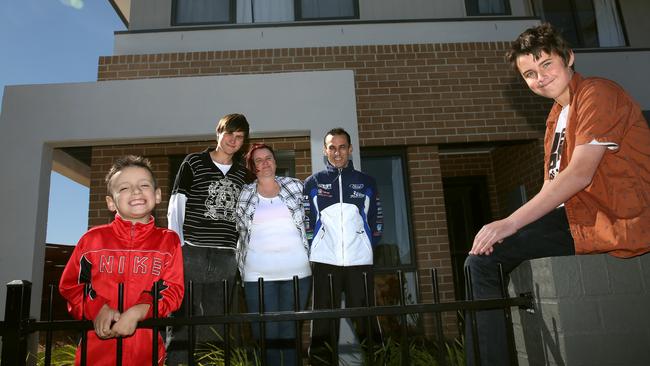Mortgage stress: 40 per cent of low-income households in Blacktown City struggling to make housing payments
BLACKTOWN City has one of the highest rates of housing stress in the country and the problem is getting worse, research shows.

Blacktown
Don't miss out on the headlines from Blacktown. Followed categories will be added to My News.
- The asbestos time bomb in our midst
- Parents plea for road safety improvements
- Man in siege at Seven Hills
BLACKTOWN City has one of the highest rates of housing stress in the country and the problem is getting worse, research shows.
The 2016 Blacktown City Social Profile shows 40 per cent of low-income households were estimated to be in housing stress.
Almost 13 per cent of those were experiencing mortgage stress and 27 per cent experienced rental woes.
The figures are up from 2006, when 36 per cent of households were in housing stress.
The rate is also higher than the rest of NSW, where 33 per cent of households were experiencing housing strains.
These results were reflected in research conducted by Western Sydney University, which found mortgage stress was consistently higher in certain parts of western Sydney than any other region across Australia.
Blacktown was ranked eighth-highest in the country for mortgage difficulties.
Investigator Professor Phillip O’Neill from the Centre for Western Sydney said the research showed people on lower incomes were particularly vulnerable to mortgage stress.
The incidence of mortgage stress was also strongly influenced by income-disrupting events such as unemployment or a marriage breakdown.
“The issue is western Sydney does have a high concentration of battlers,” Prof O’Neill said.
“It’s the poorer households without the reserves of cash that are more likely to default on their housing repayments if there is an event in their life such as family upheaval, unemployment or illness.”
Financial counsellor Thu Le from Blacktown-based CatholicCare Social Services said such problems did not just affect people on lower incomes.
“Mortgage stress doesn’t discriminate,” she said.
“We also get people on high incomes because, obviously, to have a mortgage they have to be able to service the loan from the start.”
She said mortgage stress could affect a person’s mental health, contributing to anxiety and depression.
“Some of the clients come here and they’re really worried and they can be suicidal,” she said.
“With mortgage stress, you’ll find other bills are not being paid as well, like car loans, insurance payments and utility bills.”
Ms Le said she looked at all options to help a person better manage their mortgage, including advocating to the bank on their behalf for a freeze on payments until they could sort out their finances.
“Most banks have good financial hardship programs in place,” she said.
“We also look at putting a budget in place and whether there is something they can do to increase their income.”
Ms Thu urged anyone experiencing mortgage stress to make an appointment to see a financial counsellor at CatholicCare. The service is free and open 9am to 9pm weekdays and on Saturday from 9am to 1pm.
For more information call CatholicCare on 8822 2222 or visit ccss.org.au
FAMILY MOVES TO AFFORD PAYING RENT
WITH an increasing number of people struggling to pay their rent, affordable housing in the community is helping to alleviate families’ financial pressure.
The $24 million Bridge Housing development in Bungarribee comprises 65 homes for local families on a combined income between $66,274 and $113,895. One of those families are the Azzopardis, formerly of Blacktown, who moved into their three-bedroom home last month.

Stay-at-home mum Ann-Marie Azzopardi and her husband Paul, a TAB manager, lived in the Blacktown area for many years and saw it become increasingly unaffordable.
“When we first started renting 18 years ago, it was $220 (per week),” Mrs Azzopardi said. “Now it’s $500 in some places. As soon as the house prices go up, the rent goes up.”
She said the family moved into Bungarribee after becoming dissatisfied with renting privately.
“The rent kept going up and they wouldn’t fix anything,” she said.
“If they did come out, they would only touch it up and it would break again.”
They pay non-profit Bridge Housing $410 a week in rent, much less than the $550 they would have paid if they continued renting in Blacktown.
“They put the rent up to $550 and that’s why we decided to move,” Mrs Azzopardi said. “We love living there (Bungarribee). Everything works and everything is new.”
She said there should be more affordable housing for families in Blacktown City.
“There’s a lot of people out there who really need it,” Mrs Azzopardi said.
“We know people who have moved out of the area to Mt Druitt because they can’t afford Blacktown, it’s just too dear.
“You’re lucky if you can find a place,” she said. “You look at open houses and there are 30 to 40 people there looking at the same property.”


